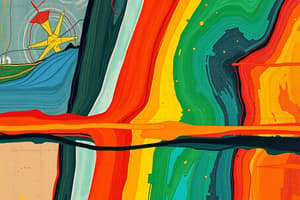Podcast
Questions and Answers
Which of the following is a force that opposes the relative motion of two surfaces in contact?
Which of the following is a force that opposes the relative motion of two surfaces in contact?
- Reproduction in animals
- Pressure (correct)
- The age of adolescent
- Light
What is the process by which organisms produce offspring?
What is the process by which organisms produce offspring?
- The age of adolescent (correct)
- Chemical effect in current
- Friction
- Pressure
Which of the following can be described as a flow of electric charge?
Which of the following can be described as a flow of electric charge?
- Pressure
- Chemical effect in current (correct)
- Friction force
- Reproduction in animals
Which of the following describes the force that opposes the relative motion of two surfaces in contact?
Which of the following describes the force that opposes the relative motion of two surfaces in contact?
Which of the following is an example of a chemical effect in current?
Which of the following is an example of a chemical effect in current?
What is the scientific study of pressure?
What is the scientific study of pressure?
Flashcards
Friction
Friction
The force that opposes the motion of two surfaces in contact.
Electric Current
Electric Current
The flow of electric charge.
Barometry
Barometry
The scientific study of pressure.
Study Notes
Physics Concepts
- Friction is a force that opposes the relative motion of two surfaces in contact.
- The process by which organisms produce offspring is called reproduction.
- Electric current can be described as a flow of electric charge.
- Friction is the force that opposes the relative motion of two surfaces in contact.
- Heating of a resistor is an example of a chemical effect in current.
- The scientific study of pressure is called barometry.
Studying That Suits You
Use AI to generate personalized quizzes and flashcards to suit your learning preferences.
Description
Test your knowledge on friction, pressure, reproduction in animals, the age of adolescent, light, and chemical effects in current with this quiz. Explore concepts from both physics and biology in one place.




